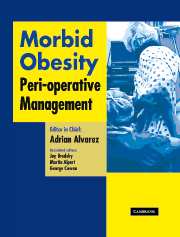Book contents
- Frontmatter
- Contents
- Contributors
- Foreword
- Preface
- Acknowledgments
- Dedication
- Section 1 General aspects
- Section 2 Pathophysiology
- Section 3 Pre-operative management
- Section 4 Peri-operative management of co-morbidities
- Section 5 Pharmacology
- Section 6 Monitoring
- Section 7 Intra-operative management
- 20 Positioning the morbidly obese patient for surgery
- 21 Airway management
- 22 Inhalational anesthesia
- 23 Total intravenous anesthesia
- 24 Anesthetic management for the obese parturient
- Section 8 Post-operative care
- Section 9 Conclusions
- Afterword
- Index
24 - Anesthetic management for the obese parturient
from Section 7 - Intra-operative management
Published online by Cambridge University Press: 17 August 2009
- Frontmatter
- Contents
- Contributors
- Foreword
- Preface
- Acknowledgments
- Dedication
- Section 1 General aspects
- Section 2 Pathophysiology
- Section 3 Pre-operative management
- Section 4 Peri-operative management of co-morbidities
- Section 5 Pharmacology
- Section 6 Monitoring
- Section 7 Intra-operative management
- 20 Positioning the morbidly obese patient for surgery
- 21 Airway management
- 22 Inhalational anesthesia
- 23 Total intravenous anesthesia
- 24 Anesthetic management for the obese parturient
- Section 8 Post-operative care
- Section 9 Conclusions
- Afterword
- Index
Summary
Introduction
The management of the obese pregnant patient presents numerous challenges to the anesthesiologist. In addition to the medical co-morbidities associated with obesity, there is an increased incidence of many pregnancy complications and a frequent need for operative management.
The number of case reports describing the management of obese parturients has grown exponentially as the incidence of obesity increases worldwide. These include sensational descriptions of Cesarean deliveries using regional anesthesia on patients with body mass indices (BMI) as great as 88. However, the collection of these anecdotes does little to help the average practitioner make decisions based on sound evidence. There remains a lack of controlled studies to help guide decision-making in this clinical arena.
Gestational weight gain recommendations
There are no definitive recommendations for optimal weight gain during pregnancy. The Institute of Medicine report on nutrition in 1990 offered limited guidelines. The report recommended a 15 lb (6.8 kg) minimum weight gain but made no recommendation for maximal weight gain and no specific recommendations for obese women. Ekblad and Grenman retrospectively reviewed the records of 191 mothers in Finland for the impact of gestational weight gain on labor outcome. Women with abnormal pre-pregnancy weight (≥20% above ideal body weight for height) or excessive weight gain during pregnancy (≥20 kg) were included in the study.
- Type
- Chapter
- Information
- Morbid ObesityPeri-Operative Management, pp. 325 - 336Publisher: Cambridge University PressPrint publication year: 2004



